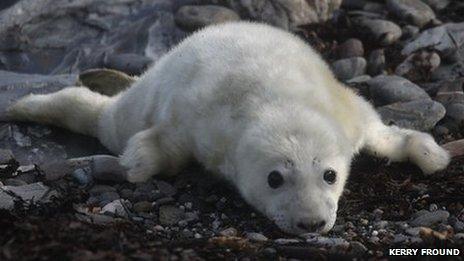Isle of Man seal calf warning as first pups are born
- Published

Around 40 grey seal pups are born on the Calf of Man each year
Wildlife experts in the Isle of Man have issued a seal pup warning ahead of the annual breeding season.
Officials from the Manx Wildlife Trust said pups may look harmless but they have extremely sharp teeth and can be aggressive if approached.
The first pups of the season were recently spotted on the Calf of Man.
Marine officer Eleanor Stone said mothers have been known to abandon their pups if they are unduly disturbed by the public.
Ms Stone said: "The wardens on the Calf of Man have found two pups already and over the next few weeks many more will begin their lives on this remote island."
Fend for themselves
The pups are born snowy white but in just a few short weeks they will shed this coat, be fattened up on their mother's milk, weaned and then left to fend for themselves.
On Tuesday, the Manx Wildlife Trust will begin a week-long monitoring programme to gain more insight into the grey seal population around the Manx coastline.
During previous surveys photographs taken of the mothers have proved that the same seals come back year after year to give birth and breed on the rocks at the Calf of Man.
Ms Stone added: "Some pups will also be born on the island, so you may come across them on a beach. Although they look cute and harmless, pups have sharp teeth and can be aggressive, so we would urge people not to approach them.
"Their mothers are very protective so could also be aggressive if they feel their pup is being threatened. Mothers may also abandon their pups, if they pick up a different scent, for example of a human or dog.
"So if you do come across one on a beach, put dogs on leads and keep to a distance to ensure that every pup has the best chance of survival."
According to the Manx Wildlife Trust around 40 pups are born on the Calf of Man each year.
Anyone concerned about a pup is asked to contact the Manx Society for the Prevention of Cruelty to Animals (MSPCA).
- Published18 July 2012